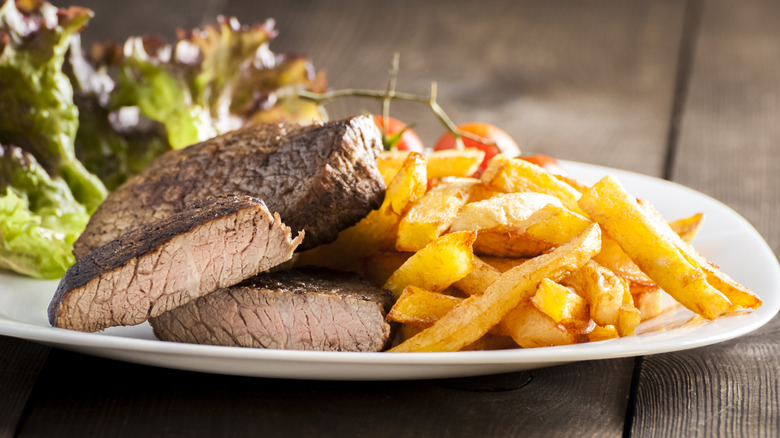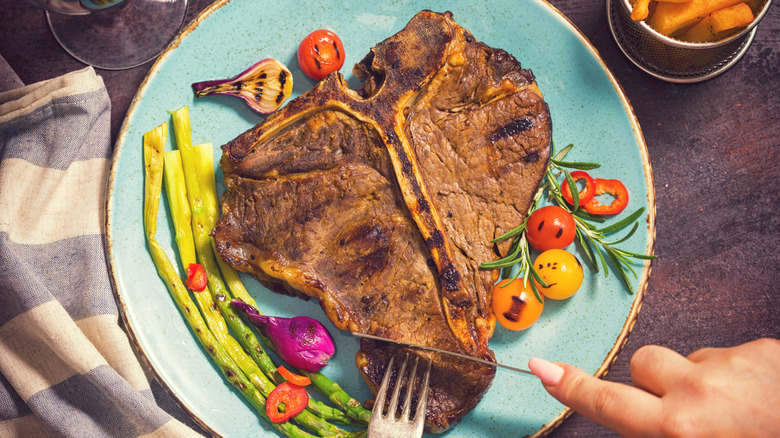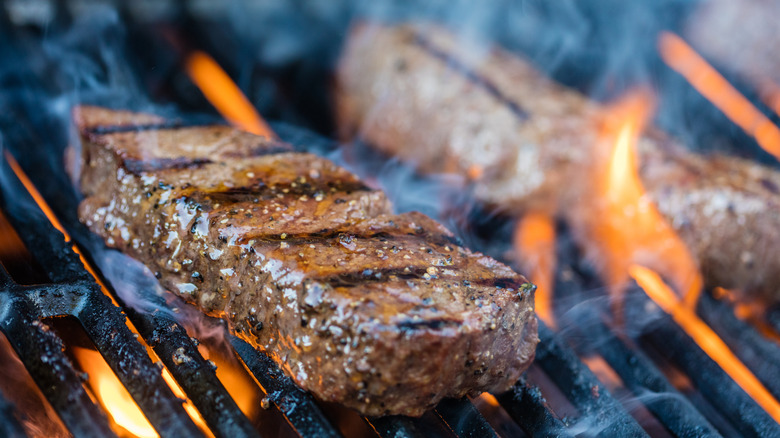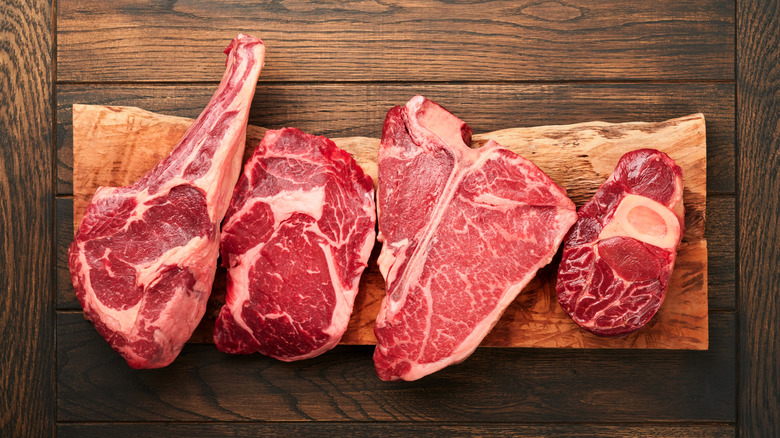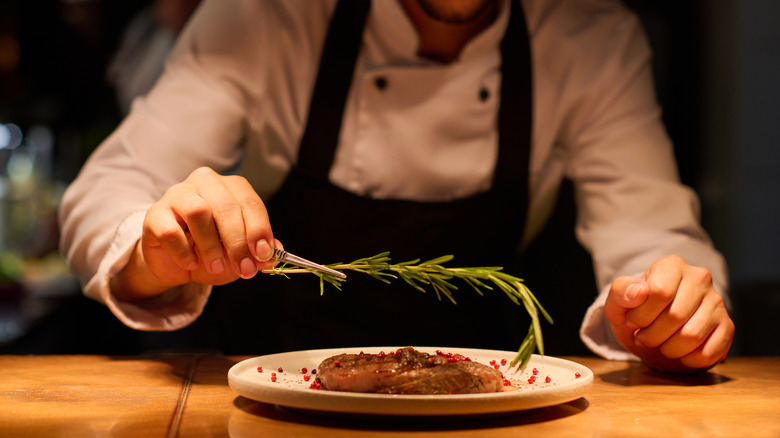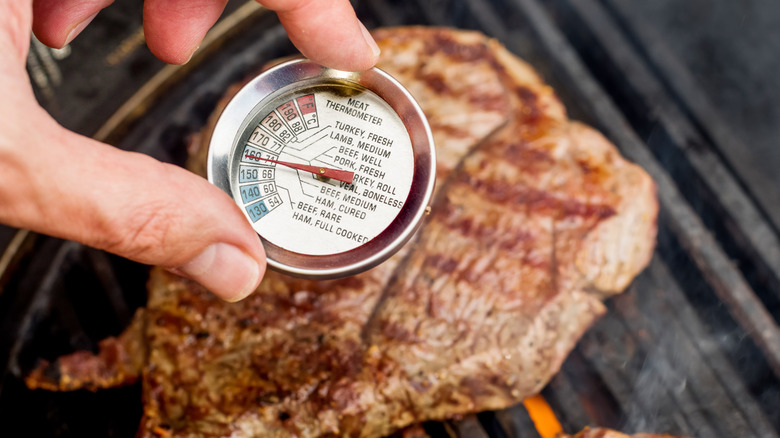Why You Shouldn't Be Ordering Your Steak Well-Done
If you are dining out and decide to order a steak, odds are your server will respond, "How would you like your steak cooked?" While there is no one correct answer, many people believe there is a wrong one: "Well done." Not only might ordering your steak well-done break your server's heart, it could also prevent you from having the best steak experience possible.
Of course, you shouldn't be eating your steak raw. The United States Department of Agriculture (USDA) advises that beef products, including steak, be cooked to a minimum internal temperature of 145 degrees Fahrenheit in order for any bacteria to be completely cooked out. When it comes to steak preparation, this temperature corresponds to a medium level of doneness. There will still be a pink interior to your meat when cooked to medium, which can turn some people away from the dish entirely.
If you feel your steak isn't cooked right when you cut into it and spy some pink coloring, you can always send it back for further cooking — but you might be sacrificing the intended taste and texture of the steak in the process. And what's worse, you might receive a less quality cut of steak from your chef, who could be offended that you uttered the phrase, "well done."
Well-done steaks are rather tough to eat
Unlike ground beef or brisket that can handle extra high heat for long periods of time and still manage to deliver the desired texture, cuts of steak are designed to be carefully (and minimally) grilled for the best mouthfeel. Your knife should easily glide when cutting into a steak, and taking a bite should feel soft and buttery, requiring little effort to chew.
When a steak is cooked for too long, it becomes tough and almost rubbery. This makes it difficult to cut into, bite, and chew — pretty much removing all desired texture from your steak. If your jaw hurts at the end of your well-done steak dinner, you might want to consider ordering it medium rare next time.
Cooking a steak too long reduces its flavor
Steak derives most of its flavor from the juices that are stored within the meat. You want your steak to taste both buttery and tender, alongside the hints of char that are delicately seared to the outer crust. With a well-done steak, however, the meat becomes much drier and less flavorful.
When a well-done steak has been dried out at a high temperature, no amount of herb butter and seasoning will be able to revive the cut of meat to its intended complexity of flavors. Much of the fat content that surrounds the meat will also be burned off during the cooking process, leaving you with a slab of meat that is one-note and underwhelming.
It wastes a perfectly good cut of meat
Many steak lovers and chefs alike believe that ordering a steak well done is a complete waste of meat. In fact, Anthony Bourdain once claimed that well-done orders get the worst cuts of steak, because most chefs don't want to waste a good cut on a steak that is cooked for what they believe is far too long. So those who order the dish with expectations of seeing absolutely no pink may not be getting their money's worth.
Steak is highly priced at most restaurants and butcher shops because of how meticulously it has been farmed and prepared. When you fry it up to the highest degree of doneness, that high quality diminishes, and you aren't experiencing its full potential — but you are still paying a premium for it. If you absolutely cannot stand to eat steak below well done, you might want to pick a different item on the menu just to get the most quality experience for your money.
Your order could offend your chef
When it comes to steak, the customer isn't always right. Some restaurants, especially those that are well-known for the dish, such as high-end steakhouses, may not even ask you how you want your steak prepared. These chefs feel that they know how best to prepare the cut of meat — so when a request for well done is received, the chef could take personal offense.
Certain chefs might completely ignore your request and prepare the steak how they see fit. And if you send it back, they will probably add more heat, but at this point you are left with a rather flavorless slab of meat and a very unhappy chef. If you really want your steak prepared the way you prefer, try cooking it at home. Otherwise, be prepared to listen to the expert when eating out, and stay open to trying what the chef deems the correct level of doneness.
It might actually be more dangerous to eat your steak well done
Part of the reason that people may be inclined to order their steak well done is out of fear of certain bacteria like E. Coli and salmonella. While these foodborne illnesses are reasons not to eat your meat raw, they are not likely to affect your steak once it has been grilled, even to a lower degree of doneness.
However, cooking your steak for too long might actually increase your risk of ingesting another unwanted substance. Cooking a steak for too long, especially at very high temperatures or over an open flame, can create an unwanted reaction within the meat that results in heterocyclic amines and polycyclic aromatic hydrocarbons. Some studies have suggested that consuming excessively high levels of these chemicals may increase the risk of certain cancers, according to the National Cancer Institute.

